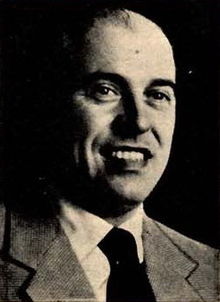Carlo Ponti
| Carlo Ponti | |
|---|---|
 |
|
| Born |
Carlo Fortunaro Pietro Ponti, Sr. 11 December 1912 Magenta, Lombardy, Italy |
| Died | 10 January 2007 (aged 94) Geneva, Switzerland |
| Spouse(s) | Giuliana Fiastri (m. 1946–1957) (divorced) Sophia Loren (m. 1957–1962) (annulled) (m. 1966–2007) (his death) |
| Children | Guendalina Ponti (b. 1947) Alessandro Ponti (b. 1953) Carlo Ponti, Jr. (b. 1968) Edoardo Ponti (b. 1973) |
| Awards |
Best Foreign Language Film 1956 La strada |
Carlo Fortunaro Pietro Ponti, Sr. (11 December 1912 – 10 January 2007) was an Italian film producer with over 140 production credits, and the husband of Italian movie star Sophia Loren.
Ponti was born in Magenta, Lombardy and studied law at the University of Milan. He joined his father's law firm in Milan and became involved in the film business through negotiating contracts. Ponti attempted to establish a film industry in Milan in 1940 and produced Mario Soldati's Piccolo Mondo Antico there, starring Alida Valli, in her first notable role. The film dealt with the Italian struggle against the Austrians for the inclusion of northeastern Italy into the Kingdom of Italy during the Risorgimento. The film was successful, because it was easy to see "the Austrians as Germans" during World War II. As a result, he was briefly jailed for undermining relations with Nazi Germany.
Ponti accepted an offer from Riccardo Gualino's Lux Film in Rome in 1941, where he produced a series of commercially successful films featuring the comedian Totò. In 1954 he had his greatest artistic success with the production of Federico Fellini's La strada. However, Fellini denied Ponti's role in its success and said that "La Strada was made in spite of Ponti and De Laurentiis". Ponti produced Boccaccio '70 in 1962, Marriage Italian Style in 1964, and Yesterday, Today and Tomorrow in 1965. He produced his most popular and financially successful film, David Lean's Doctor Zhivago, in 1965. He subsequently produced three notable films with Michelangelo Antonioni, Blowup in 1966, Zabriskie Point in 1970 and The Passenger in 1974.
...
Wikipedia
